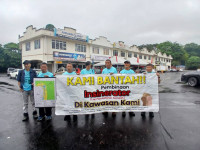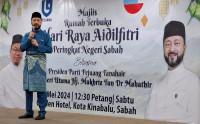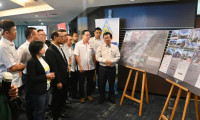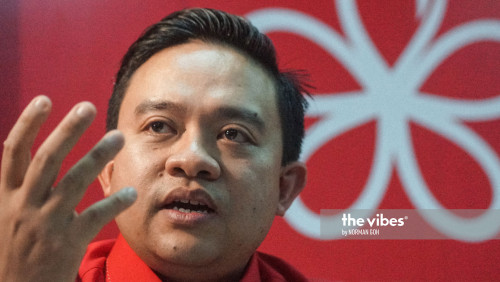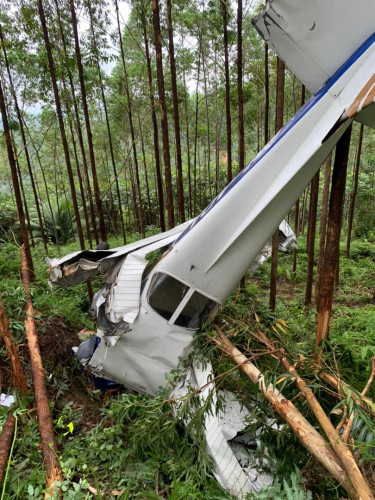NESTLED within the heart of Titiwangsa, the interview team pulled up into the driveway of Sutra House.
That morning, the photographer and I finally got a detailed look inside the creative and learning base of artists who are intrigued by one of our nation’s treasured living personalities, Datuk Ramli Ibrahim.
A celebrated figure in the arts in the country and abroad for his devotion towards Indian classical dance, he welcomed us by giving a quick tour of the abode that the Sutra Dance Theatre calls home before we set up for our one-on-one.
“Let’s get you both a cup of coffee to start the day. I need one, too,” says Ramli. He had rushed from his home in Petaling Jaya to entertain the morning’s interview with The Vibes to talk about his latest production.
Delighted by the artworks and interior setting which feels so much like home, I can’t help but ask what inspires the 70-year-old artistic director and chairman of Sutra Foundation, trying to understand which of his trained dance forms – ballet, modern, and Indian classical – excites him most.
“Odissi has always resonated with my temperament, and in my love for it, I have always tried to push for its contemporary side, or to use Odissi in my contemporary work because I love the lyricism of the curvature that is produced in the performance,” Ramli shares.
“Ballet and Bharatanatyam are very straight-lined, and I'm not straight in my way of approaching things. I love this option of the darker aspect in the movement of life that Odissi offers. It is not so much the convent-girl type of approach.”
*More from our interview with Datuk Ramli Ibrahim below
The Vibes: Thanks for hosting us here at Sutra House. We are happy that ‘Triple Frontiers (Odissi)’ has finally kicked off after being postponed twice due to the pandemic. Are you relieved?
RI: I am because it is so difficult to have a performance in Malaysia. It is a miracle because we always have to take whatever that is given to us. For instance, if The National Department for Culture and Arts (JKKN) is able to get the space rent-free, and be a title sponsor in return, which covers the cost of around RM10,000, we would take it.
Even if MBPJ wants to do the same, that is fine because we would welcome them as co-presenters of this production with open arms. I am very confident with the material itself since we [Sutra] have that particular touch where everyone is amazed by what our dancers interpret on stage.
TV: Was there a reason behind having the first stage of the Malaysian premier hosted in Seremban?
RI: I have not just performed in Seremban but also in Malacca, but to answer your question – I simply cannot just perform in Kuala Lumpur.
We are one of the most toured groups in Malaysia. No one can beat us in this; we travel, not just overseas, but within the country as well. For example, I am able to recognise the director in Seremban and acknowledge that he was the same person based in Perlis on one of our past trips there.
JKKN has got wonderful theatres and sets but unfortunately, they are badly maintained. One of the main reasons we perform outside of Kuala Lumpur is because these stops all have beautiful cultural centres. Our activities help to keep the attention towards these facilities so that these spaces would not be wasted buildings.
TV: We saw a series of images on your Instagram profile of your time together with the gurus, dancers, and musicians you have worked closely with over the decades. How has the relationship between students and gurus evolved over the decades with change?
RI: Millennials exist in a different paradigm. I think the whole digital technology and artificial intelligence era, including the way young people engage in the mobile and social media space, affects how they view their parents, the government, and the arts.

What the world is undergoing now will affect each and every one of us. I am a perfect believer in the metaphor of karma, in the sense that there is a cause-and-effect to everything we do and how the world engages with itself. An individual somewhere, even in Siberia, is going to affect us.
I have kept myself over the decades fairly even when cultivating the relationship between dancer and guru, or what in traditional Indian philosophy is called the ‘guru-shishya-parampara’ tradition, where the highest esoteric teachings of the work have to be conducted one-to-one. This, I firmly believe in.
There is a very strong relationship between my top students and me – students who I feel are closest to the core of the art. They have this personal relationship to the point where I believe that they even know how to make my coffee or tea just right. I say this because the ‘rasa’ comes from every little detail that you do – down to the very sensitivity of things.
TV: What do you make of the present arts scene, especially on what aspects can be encouraged?
RI: Well, what do you mean, Amalina? There are so many areas in the arts that are interrelated: I think politics is interrelated with the arts. The arts, likewise, then influence how government bodies look at themselves. It is basically all about getting into the act.
...If they (the officials) think that Mak Yong can live in Istana Budaya – or in Aswara – they are dead wrong. These art forms must come up from the community that originally sustains and cradles it.
It’s a very confusing affair, and I do not want to spend the next five important years of my life having to deal with what I call the ‘mundanity of petty politics'. After all, ‘they’ have not supported me at all. By ‘at all’ I mean I have only received crumbs but in spite of this, I have sustained.
Hard to believe, right? You walk into my place today and you will think—‘oh, this does not look like the place of a struggling artist…’ I have friends who ask me why I need a sponsor because of what they see, but this level of subsistence, in reality, comes from the love and passion so that we – myself and all those at Sutra – manage to live our life as an art form.
Somehow over the years, we have managed to survive, and always kind of come through despite the odds. If a higher power does exist, then I have always felt blessed by a certain grace of God that I come out of all that I do creatively.
TV: So, there are no areas of growth that you would like to see at all?
RI: I was about to say the only thing I feel some regret for is what is happening with the Malay art forms because I thought the Malay forms were going to be taken up by the Kementerian Kebudayaan.
However, look at the Malay cultural genocide that is happening in Kelantan and Terengganu today. It is a very saddening thing to acknowledge because if they (the officials) think that Mak Yong can live in Istana Budaya – or in Aswara – they are dead wrong. These art forms must come up from the community that originally sustains and cradles it.
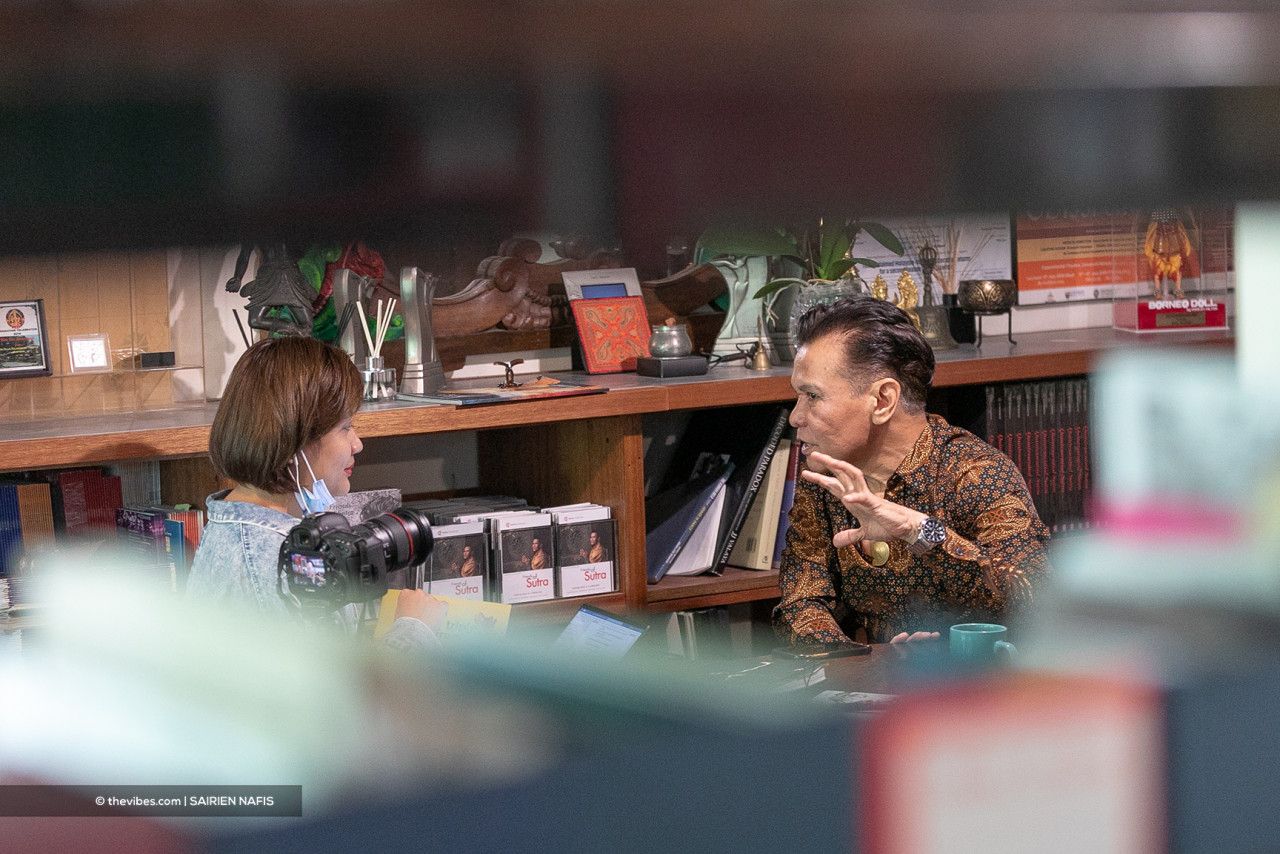
TV: There is an importance of upholding culture, even more so today then?
RI: The definition of culture is a way of life – how we live, eat, dress, communicate... So, if the Malays are concerned with the Arabisation of their lifestyle, they will do their best to not forego all these aspects of their life and culture.
As you can see, Kelantan was – and is – the gedung seni (reservoir of the arts) where when they occasioned the Puja Umur (festival to commemorate the birthday) of the sultan, at least 12 different types of art forms were presented, including Mak Yong, Menora, Main Puteri, Wayang Kulit, Gendang and even Layang-layang. These are essential to the cultural system that exists, but they will not be of significance if that is not promoted within the ecosystem of the culture it represents.
TV: Looking towards the future, are you hopeful that the generation after you will dedicate their lives to dance and the art that you uphold true to how you have practised it?
RI: You know, a lot have come to ask, “What is your plan of succession, Ramli?”, and right now I am not concerned about that because I am sowing the seeds everywhere. How the seeds will grow is not within my power to determine.
Parents who try to orchestrate their children's career know it does not work so easily. What you can do is just let go, spread the knowledge, the art form and leave for somewhere when the time comes. The legacy will take its course organically.
I do not have ambitions. You know, like the idea of, "Oh OK, I want a BMW or a Mercedes-Benz". I do not have that.
The true Tree of Life will keep on growing and branch out – sometimes with different flowers. Of course, you have to take everything into account that a few will turn out to be completely virulent and will try to kill the old tree, but this is part and parcel of the whole system and I have eventually learnt to let go.
If they do not stab you in the back, consider yourself lucky, a friend once told me. So, it is not just true in politics, but also in the arts.
TV: How can that be healthy for the community?
RI: No, it is not about that at all. We let it go because the karma in life will finally catch up. In that process, I let it all go with a kind of kiss of breath and say, “good on you – go and get whatever opportunities you deserve”.
I mean, life is so complex as it is, and it is very difficult to survive in the arts world already. You really must go right to the top of it. So, in situations as I have mentioned, the riddles do not bother me that much.
TV: Given where you are now, do you still have unfulfilled ambitions?
RI: I do not have ambitions. You know, like the idea of, "Oh OK, I want a BMW or a Mercedes-Benz". I do not have that. I just do what I can and when the day is done, I simply sit and am happy about it.
I think what I want most is to fulfil my raison d'être by realising my full potential all the time. When I am spent, when I feel that I have done everything I could because my body is telling me, that the vessel can go: it is like, ‘let's finish it off with a curtain call and a nice bow.’ Thank you. – The Vibes, April 9, 2021



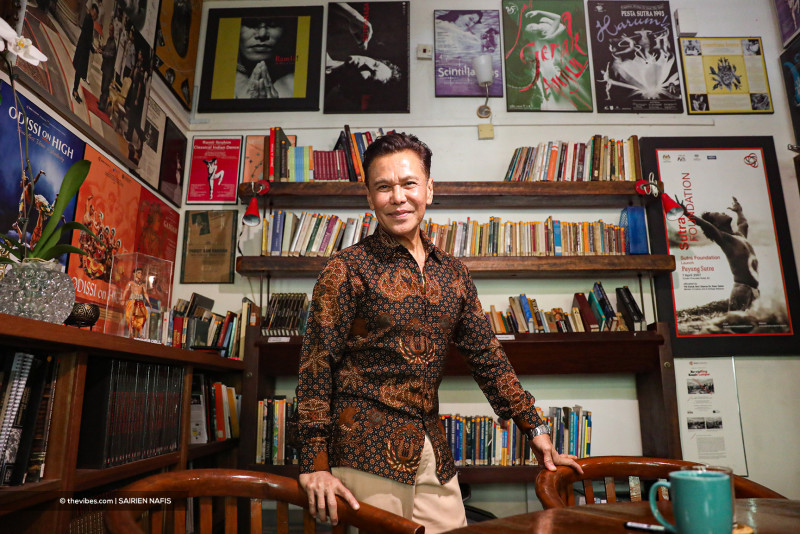

.jpg)

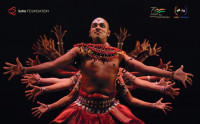

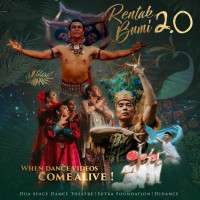
.jpg.-1.jpg)
